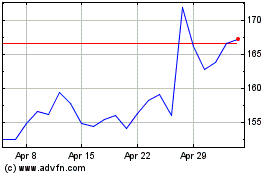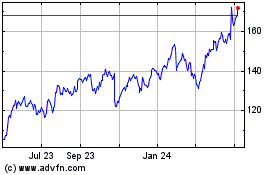By Parmy Olson and Brianna Abbott
Google's artificial-intelligence unit says it has developed an
algorithm that can predict who is at high risk of developing a
common kidney condition.
The algorithm, developed by the DeepMind Health laboratories at
Google parent company Alphabet Inc., marks a new application of
machine learning in health care. Yet it also shows the shortcomings
of many such efforts so far, in this case partly because the
algorithm is accurate a little more than half the time.
The algorithm could predict the sudden deterioration of kidney
function, called acute kidney injury, two days before the potential
injury with 55.8% accuracy, according to a paper published in the
journal Nature on Wednesday. For the more severe kidney injuries,
like cases that later required dialysis, the accuracy was closer to
90%.
The algorithm flagged two false alarms for every one correct
prediction, according to the paper, with some of the false flags in
patients with chronic kidney disease.
Some health-care-technology experts cautioned that such an
algorithm would need further testing before being applied in a live
hospital setting, which has a more diverse array of patients and
often incomplete information about them. DeepMind Health had built
its system using records from the U.S. Department of Veterans
Affairs for patients that were 94% male.
Eric Topol, director of the Scripps Research Translational
Institute who wrote a book on artificial intelligence in medicine,
didn't see a problem with the model's miss rate because doctors are
used to working with uncertainty, though he still doesn't think the
algorithm is ready for the clinical setting.
"It's got a lot of promise," Dr. Topol said. "But it really
needs to be shown with a much more general population."
Dominic King, DeepMind's medical director, said the company had
evidence that it could apply its algorithm to demographics other
than men, and would further develop its model using a more diverse
set of patients before applying it in hospitals.
DeepMind plans to incorporate its unnamed algorithm into an app
that alerts doctors of patients at risk for acute kidney injury in
12 to 18 months, Dr. King said. Such use would mark DeepMind's
first application of artificial intelligence in health care, which
the company is hoping to commercialize.
More than 100 doctors at eight hospitals in London are already
using the app, called Streams, which can identify patients with
acute kidney injury.
Currently the Streams app uses the results from a blood test --
measuring levels of a waste product in the body called creatinine
-- to warn the doctors via their phones that a patient on their
ward is showing signs of acute kidney injury.
"What we're talking about here is, at some point in the future,
moving away from alerts generated on half a dozen individual bits
of information, to a more comprehensive prediction based on the
wider electronic health records," Dr. King said in an
interview.
A number of firms have been bringing artificial intelligence to
various aspects of health care, from research into the molecular
roots of disease to determining the best course of treatment for
patients.
Identifying patients at risk of developing a medical condition
could help doctors and health insurers intervene ahead of time,
helping the patient and reducing costs.
Acute kidney injury refers to abrupt declines in kidney
function, limiting the organ's ability to filter waste from the
blood. Untreated, the condition can lead to long-term kidney damage
and even death. It often occurs among diabetes and hospital
patients. Some cases are preventable, if they are caught early
enough.
To develop a model for predicting who is at risk of the sudden
episodes, DeepMind used an approach to artificial intelligence
called machine learning to look for patterns in the Veterans
Affairs electronic health records and build a model for predicting
those at risk of acute kidney injury.
"It's trying to find patterns in that sea of very complex
information," said Dr. King.
The model that emerged analyzes thousands of pieces of
information about a patient, such as age, blood pressure and timing
of movement from one hospital bed to another, from their electronic
health records to determine risk of acute kidney injury.
DeepMind said its model can identify high-risk patients two days
before doctors would normally diagnose it.
Yet some outside experts said the models weren't ready for use
in the real world.
"It's pretty opaque in terms of what it teaches either renal
specialists or machine-learning specialists," said Julia Powles, a
law professor at the University of Western Australia who researches
the way technology companies gather data.
Aside from involving patients who were nearly all male, 13% of
the patients in the Veteran Affairs database had acute kidney
injury compared with, for instance, 20% of people in the U.K., Ms.
Powles said. The discrepancy, she said, could make it harder to
transfer findings from that study to a wider patient
population.
Write to Parmy Olson at parmy.olson@wsj.com
(END) Dow Jones Newswires
July 31, 2019 13:15 ET (17:15 GMT)
Copyright (c) 2019 Dow Jones & Company, Inc.
Alphabet (NASDAQ:GOOGL)
Historical Stock Chart
From Mar 2024 to Apr 2024

Alphabet (NASDAQ:GOOGL)
Historical Stock Chart
From Apr 2023 to Apr 2024
